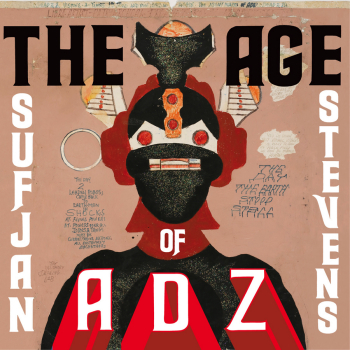It’s hard to get the measure of a man like Sufjan Stevens. Clearly one of his generation’s most intelligent and talented artists, the briefest glance at the bigger picture reveals a mess of contradictions: a check-shirt wearing, banjo-picking folkie who’s equally adept at arranging for orchestra or pro-tools, and as happy collaborating with moody rockers like the National as with gospel groups like the Welcome Wagon. A devout Episcopalian who refuses to discuss long-running speculation about his sexuality, whose lyrics are full of spiritual and religious references but who enjoys playing elaborate pranks (such as claiming he’d fathered a child with friend and label-mate Rosie Thomas) at the expense of his loyal fans. In recent years, Stevens’ musical output has reflected all this conflict, hinting at an artist creatively lost at sea, and his latest monumental album, The Age Of Adz, does little to steady the boat.
Ever since his "50 States" project slipped off the tracks with two consecutive albums about Illinois, Stevens’ musical decisions have seemed a little erratic: Christmas songs, multimedia performances, orchestral remixes and a collaborative ambient album have yielded diminishing returns, while last month’s unannounced, hour-long All Delighted People EP was interesting at best but ultimately frustratingly messy. So when it emerged that The Age Of Adz – officially the first proper Sufjan album since 2005’s Illinoise – was conceived as an entirely electronic work, some of his most faithful followers could be forgiven for fearing the worst. Thankfully, it seems Stevens reached a compromise with his better judgment, and finding room for live instruments and orchestral flourishes has proved to be perhaps the smartest move he’s made in the last five years.
That isn’t to say that Age) is an unqualified success, though; in fact the reality is far from it. While kicking off the album with the folk-tinged piano and guitar ballad ‘Futile Devices’ is like the unexpected return of a long lost friend – harking back, as it does, to the fondly remembered Seven Swans days – the spell is broken almost immediately by the arrival of ‘Too Much;, a song summed up all too well by its own title. What starts off as a pleasant earworm melody anchored by gently humming synths and crunchy electronic rhythms gradually blossoms into a comically overblown finale, complete with choirs, strings, woodwinds and brass fanfares, and an explosion of scattershot beats that wouldn’t sound out of place on an Atari Teenage Riot track. It’s as if Stevens has tried to crowbar every style of music he’s ever turned his hand to into one piece, regardless of whether or not they fit together.
It’s an interesting concept, perhaps, for an album closer or centerpiece, but on Age Stevens hammers the idea to the point of overkill. Here we have an hour plus change of music, roughly two thirds of which follows a maximalist formula. The result is that all too often the avalanche of sounds start blending together into little more than background noise; for example, it takes the usually mild-mannered Stevens dropping F-bombs on ‘I Want To Be Well’ to draw attention to the fact there’s a sonic shit-storm going on behind him. There are times, however, when the everything-plus-the-kitchen-sink approach does work brilliantly; ‘Vesuvius’ piles free jazz horns and feedback on top of synthetic organ and beats and channels the disparate elements into something truly volcanic, while – ironically – the 25 minute closer ‘Impossible Soul’, which features all of the above plus meaty prog-rock guitar solos and auto-tuned vocals, turns out to be the album’s most compelling track.
While the busier moments often struggle to sustain interest, the album’s high points are tracks like ‘I Walked’ and ‘Now That I’m Older’, where a single idea is left to bloom; the former a relatively simple, subtle synthetic pop tune, the latter a haunting choral drone hymnal that both recall Stevens’ more affecting earlier work. All of which begs the question: can such a massive departure really be deemed a success? It’s doubtful many existing fans will take kindly to being bludgeoned with jackhammer beats, but it is easy to appreciate Stevens’ desire to do something new and interesting; and it’s hard to begrudge any artist for wanting to move forward. Then again, Age is hardly an original concept, and despite some optimistic initial reports the album is certainly no Kid A (a more accurate comparison would be Bright Eyes’ electronically enhanced Digital Ash In A Digital Urn). At this moment, Stevens seems stuck between a rock and a hard place, trying to please the faithful while at the same time needing to stretch himself creatively. That he succeeds at the latter is an admirable feat in itself, and there may yet be cause for celebration if he also manages the former, but attempting to have his cake and eat it is either extremely brave or wildly reckless. This is Sufjan Stevens we’re talking about here, though: in typically contradictory fashion, let’s settle for both.


